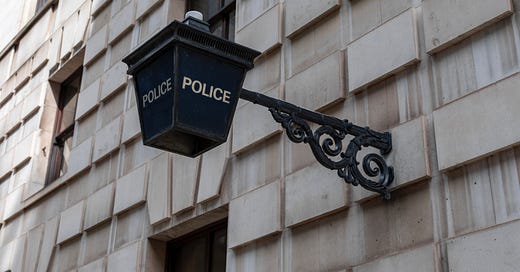Survivors' Voices: Reporting to the Police
I often see comments online in response to stories about sexual abuse that say "Just report to the police!" or "Go straight to the police!" I think these commenters mean well, and usually they're responding to problems with internal reporting mechanisms in a church, school, or other organization. But I also think there's sometimes a lack of understanding of how difficult it can be to make a police report - and that not all, or even most, reported sexual assaults are prosecuted. I thought you might appreciate hearing from some people who have experienced sexual abuse by a Catholic leader with their thoughts and experiences on the topic.
I wasn’t really able to process that what had happened to me was rape for several years. By the time I had the wherewithal to talk about it, I no longer even lived in the same country as I had when I was raped. I don’t even know what justice would look like in that situation but I knew it didn’t involve contacting foreign police and getting overwhelmed by a foreign legal system and having to tell a bunch of strangers halfway around the world about it. I wish people understood that trauma takes time to dawn on you - it’s not always possible to immediately seek legal or psychological help.
When I reported my abuse to the police, it was four or five years after the fact. (I was very sexually naive and struggling with a mental illness as a college student, and it took me that long to realize what had happened was abuse.) Because I was technically an adult, the statute of limitations had run out. The officer who took my call told me that they couldn't prosecute. I said, "I know. I'm calling so there's something in your file cabinet if he does it again and someone approaches you about it." Hopefully that report still exists in their records somewhere. The abuser, so far as I know, still lives in close proximity to college students.
I submitted a report some time after the incident even though no "crime" was committed. I had already reported to the religious order and the diocese by then, with no meaningful action taken by either entity. I called first and talked to a policeman about what happened and he recommended I get it documented. A police lieutenant took my statement and put it in a file so that if there are any more incidents reported to the police department, my story would be there to corroborate the new story. It was a very difficult experience, but I'm glad I did it. It also gave me an opportunity to tell my story to the police in the small town where it all happened. The policeman I talked to was a parishioner of the priest about whom I reported. I could tell that it made the policeman very uncomfortable, but he also listened, asked thoughtful questions, and I think he believed me. That was important.
Reporting to the police was an exercise in futility, and highly triggering. I filed a claim with a Church Compensation Fund. The Fund told me that they would not accept my application without a police report. I explained to them that I was in my late 60’s, and that the clergy assaults began over 50 years ago, starting in second grade, and continuing into high school. I also told them that the head perpetrators died decades ago, and that I could offer no hard documentation such as rape kits, witness statements or reports. (How could there be? The rapes happened behind closed doors, with no witnesses other than the perpetrators, of which there were many, and as a young child, I had no way of knowing at the time that what they did to me was criminal.) The Fund personnel STILL insisted that I file the police report… in a State I no longer lived in, as I had moved away long before. Trying to file a police report under these circumstances was disorienting, humiliating, and incredibly triggering. Venue hassles and not having anyone assigned to take sensitive cases added to the trauma, as I had to explain my story to multiple individuals, and I knew, and they knew, that there was absolutely nothing they could do for me. Being forced to go through the motions felt like yet another assault.
My abuse occurred when I was a child during the years 1978-1981. At that time, I didn't know what the priest was doing to my body was a crime. I didn't know who a safe adult was to tell, so I kept it all inside. In 2006, I finally had the courage to speak about my childhood trauma and the abuse imposed upon me. I told my wife. I spoke to my local parish priest, and I told my story to officials at the Archdiocese of Chicago. I did not tell the police. I haven't really thought about why until this moment. I guess I didn't have the confidence the people there would take me seriously or know what to do with my story once I told it to them.
If you have experienced sexual abuse in the Catholic Church and have your own experiences to share on this topic, I would be grateful to include your perspective. You can find information about joining the Survivors’ Voices Panel here: An Invitation for Survivors.
I will have the second half of this post next week, so please subscribe here if you’re not already signed up.
Thank you,
Sara



